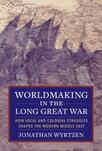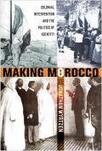Jonathan Wyrtzen
Modern North Africa, Middle East, empire, colonialism, nationalism, ethnicity, state-formation
Jonathan Wyrtzen’s teaching and research engage questions related to empire and colonialism, state formation and non-state forms of political organization, ethnicity and nationalism, and religion and socio-political action. His work focuses on society and politics in North Africa and the Middle East, particularly with regards to interactions catalyzed by the expansion of European empires into this region.
His first book, Making Morocco: Colonial Intervention and the Politics of Identity (Cornell University Press, 2015) examines how European colonial intervention in Morocco (1912–1956) established a new type of political field in which notions about and relationships among politics and identity formation were fundamentally transformed. Instead of privileging top-down processes of colonial state formation or bottom-up processes of local resistance, the analysis in Making Morocco focuses on interactions between state and society. During the Protectorate period, interactions among a wide range of European and local actors indelibly politicized four key dimensions of Moroccan identity: religion, ethnicity, territory, and the role of the Alawid monarchy. This colonial inheritance is reflected today in ongoing debates over the public role of Islam, religious tolerance, and the memory of Morocco’s Jews; recent reforms regarding women’s legal status; the monarchy’s multiculturalist recognition of Tamazight (Berber) as a national language alongside Arabic; the still-unresolved territorial dispute over the Western Sahara; and the monarchy’s continued symbolic and practical dominance of the Moroccan political field.
His second book, Worldmaking in the Long Great War: How Local and Colonial Struggles Shaped the Modern Middle East (Columbia University Press, 2022), reexamines how the First World War unmade the greater Ottoman political order that had shaped the Middle East for centuries and opened up the possibility for local and European actors to reimagine political identities and political futures within the region. Running against the standard narrative of European colonial powers imposing artificial boundaries at the Paris Peace Conference, this reexamination of the formative moment in the Middle East’s modern history presents a much more complicated and violent story. The book shifts the frame of the Great War in two important ways: expanding the geographic scope to stretch from Morocco to Iran and the temporal scope to extend into the 1930s. It demonstrates that, instead of an imperial drawing room, it was in and through violent clashes on the ground among competing local and colonial projects during the latter phases of the Long Great War in the 1920s-30s that the Middle East’s states, boundaries, and identities were remade.
He has three current research streams. One focuses on how and why a spatially and symbolically differentiated “metropole” emerges in phases of imperial expansion (and contraction), using the United States and France in the long 19th century as key comparative cases. The second, tentatively titled Not Alone Star: Five Hundred Years of Global Texas History, traces the entangled history of Texas from the first contact of indigenous communities with the Moroccan, Mustapha “Estevanico” Azzemouri, and the other shipwrecked survivors of the Spanish Narvaez expedition near Galveston in 1528 through SpaceX’s attempt to link Texas to Mars. The third stream centers on colonial forces deployed across Asia and Africa during the thirty-years decolonization war period in the mid-20th century (1945-75).
Books
- Wyrtzen, J. 2022. Worldmaking in the Long Great War: How Local and Colonial Struggles Shaped the Modern Middle East. New York: Columbia University Press.
- Robert L. Jervis and Paul W. Schroeder Best Book Award, 2023, International History and Politics Section of the American Political Science Association
- Honorable Mention, Barrington Moore Book Award, 2023, Comparative Historical Section of American Sociological Association
- Honorable Mention, Francesco Guicciardini Prize in Historical International Relations, 2023, International Studies Association
- Wyrtzen, J. 2015. Making Morocco: Colonial Intervention and the Politics of Identity. Ithaca: Cornell University Press.
- President’s Book Award, 2016, Social Science History Association
Articles
- Wyrtzen, J. 2017. “Colonial War and the Production of Territorialized State Space in North Africa,” Political Power and Social Theory, 33:151-173.
- Wyrtzen, J. 2017. “Colonial Legitimization-Legibility Linkages and the Politics of Identity in Algeria and Morocco,” European Journal of Sociology, 58(2):205-235.
- Wyrtzen, J. 2013. “Performing the Nation in Anti-Colonial Protest in Interwar Morocco,” Nations and Nationalism. 19: 615-34.
- Guhin, Jeffrey, and Jonathan Wyrtzen (2013). “The Violences of Knowledge: Edward Said, Sociology, and Post-Orientalist Reflexivity.” Political Power and Social Theory 24:231-262.
- Wyrtzen, J. 2011. “Colonial State-Building and the Negotiation of Arab and Berber Identity in Protectorate Morocco,” International Journal of Middle East Studies, 43:227-49.
Chapters, Reviews, and Other
- Wyrtzen, J. 2023. “Middle Eastern and North African Nationalisms.” In Matthew D’Auria, Cathie Carmichael, & Aviel Roshwald (Eds.) Cambridge History of Nationhood and Nationalism. Cambridge: Cambridge University Press. (refereed)
- Wyrtzen, J. 2022. “Relational History, the Long Great War, and the Making of the Modern Middle East.” In Natana Delong-Bas (Ed.) Islam, Revival, and Reform: Redefining Tradition for the Twenty-First Century. Syracuse: Syracuse University Press.
- Wyrtzen, J. 2018. “The Commander of the Faithful and Moroccan Secularity.” In Mirjam Künkler, John Madeley, & Shylashri Shankar (Eds.), (pp. 317-341) A Secular Age Beyond the West: Religion, Law, and the State in Asia, the Middle East, and North Africa. Cambridge: Cambridge University Press.
- Wyrtzen, J. 2014. “Colonial Legacies, the Nation and the Challenges of Multiculturalism in North Africa.” In Moha Ennaji (Ed.), (pp. 17-34), Multiculturalism and Democracy in North Africa: Aftermath of the Arab Spring. New York: Routledge.
- Wyrtzen, J. 2013. “National resistance, amazighité, and (re-)imagining the nation in Morocco.” In Driss Maghraoui (Ed.), Revisiting the colonial past in Morocco (pp. 184-99). New York: Routledge.
- Wyrtzen, J. 2011. Reflections from Morocco on the Arab Spring, Trajectories, Spring 2011, Vol. 22, No.2.
- Wyrtzen, J. 2010. Review of The Moroccan Soul: French Education, Colonial Ethnology, and Muslim Resistance, 1912-1956 by Spencer Segalla The Journal of Modern History, 84 (4): 956-58.
- SOCY 102, Introduction to the Middle East
- SOCY 135, Islamic Societies, Culture, and Politics
- SOCY S135, Society and Politics of North Africa (Taught in Morocco)
- SOCY 210, The State and its Environment
- SOCY 232, Islamic Social Movements
- SOCY 320, World War I and the Making of the Modern Middle East
- SOCY 339b, Imperialism, Insurgency, and State Building in the Middle East
- SOCY 372a, Nationalism in North Africa and the Middle East
Graduate
- SOCY 512, Sociology of Islam
- SOCY 551, Comparative and Historical Methods
- SOCY 559, Nationalism in North Africa and the Middle East
- SOCY 567 Postcolonial Social Theory
- SOCY 563, Imperialism, Insurgency, and State Building in the Middle East
- SOCY 617, Agrarian Societies: Culture, Society, History, and Development
Affiliations
- Council on Middle East Studies
- Council on African Studies
- Center for Comparative Research
- Program in Agrarian Studies
- Political Violence and its Legacies Workshop
- Jackson School of Global Affairs
National & International
- American Sociological Association (ASA)
- Middle East Studies Association
- American Institute for Maghrib Studies
- Social Science History Association


